Slobot About Town XCIII:
 |
 |
Musicians of Spartanburg!

It was a beautiful summer day and Slobot was playing his accordion,
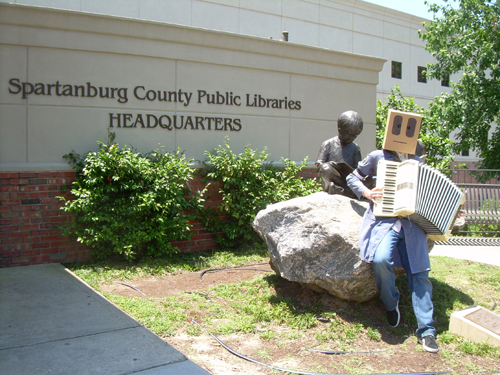
playing his accordion at the Spartanburg County Public Libraries Headquarters!
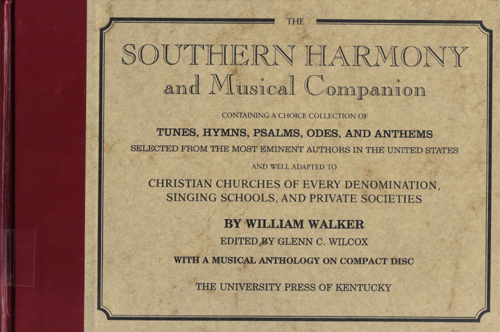
Inside the library Slobot found a copy of William "Singing Billy" Walker's The Southern Harmony and Musical Companion! |
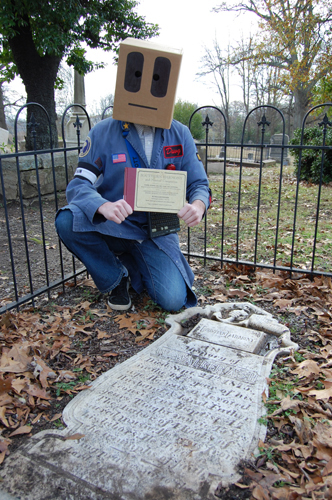
Slobot would spend so much time studying Walker's Southern Harmony that, by the time he would leave the library, the leaves had fallen... |
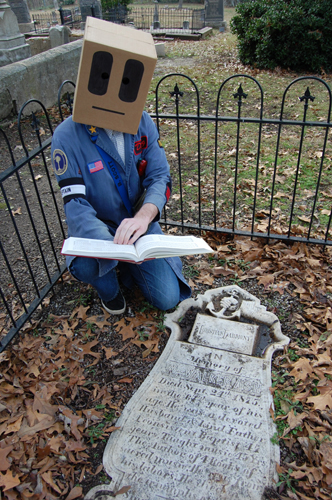
fallen on the grave of William Walker.

William Walker would be born near Cross Keys, South Carolina in 1809. In 1835, Walker would publish The Southern Harmony, a tunebook written using a four-shape shape note system of notation. |
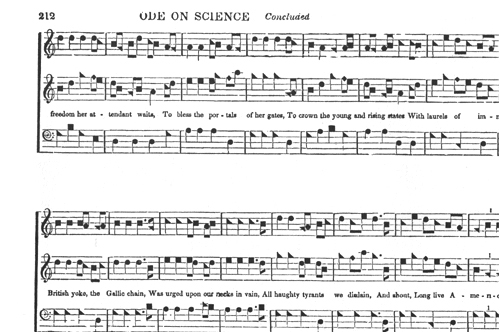
The idea behind shape notes is that it is easier to both teach and learn parts for singing if the music is printed in shapes that match up with a system of fa-so-la-fa-so-la-mi-fa syllables with which a major musical scale can be sung. The shape for fa, for example, is a triangle, sol an oval, la a rectangle and mi a diamond. In 1867, Walker would adopt a seven-shape shape note system in order to better match the do, re, mi, fa, sol, la, and ti syllables that are more typically used to sing a major musical scale and publish a new tunebook, Christian Harmony. |
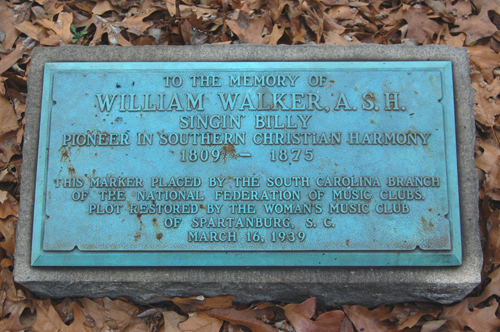
A young Chris Robinson would briefly attend Wofford College. Years later, he and his band, The Black Crowes, would name their second album, The Southern Harmony and Musical Companion. Slobot would wonder if Chris Robinson had named the album after having seen William Walker Memorial Singing while at Wofford. |
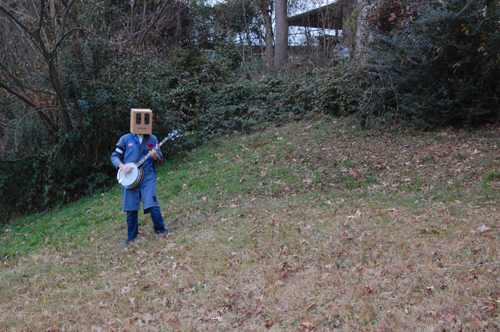
"Dueling Banjos" is a song made famous by John Boorman's 1972 film, Deliverance. In that movie a seemingly inbred banjo player named Lonnie plays a duet with character Drew Ballinger on guitar. That song, "Dueling Banjos," would become a minor hit. |
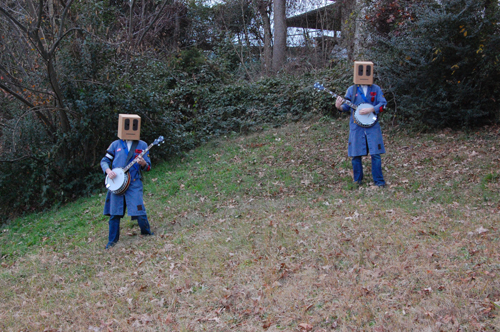
"Dueling Banjos" began life as "Feudin' Banjos," a song written by Clinton, South Carolina's Arthur "Guitar Boogie" Smith. Smith would record that song in 1955. Joining Smith in the studio on that track would be Spartanburg's own Don Wesley Reno on five-string banjo. In the wake of the release of Deliverance, Smith and Reno would sue the filmmakers for unlicensed and uncredited use of the song. The court would rule in Smith and Reno's favor and order that the makers of the film and its soundtrack give Smith and Reno song-writing credits and back-royalties. |
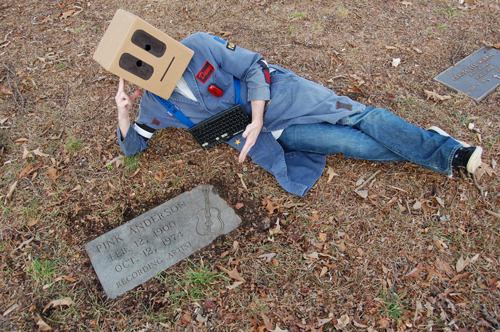
Another local powerhouse of a musician would be Pinkney "Pink" Anderson. Born in Laurens, South Carolina; Anderson would cut his teeth playing the Indian Remedy Company Medicine Show of Dr. W. R. Kerr. |
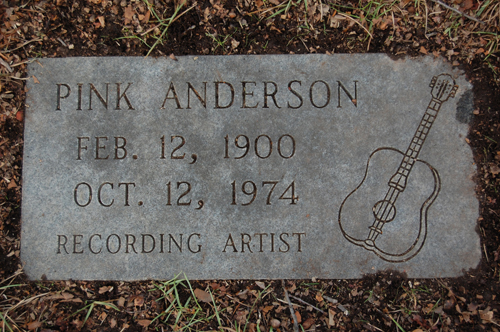
Pink's name lives on not only in his music; or that of his son, Alvin "Little Pink" Anderson; but also as the forename of the legendary UK rock act, Pink Floyd. The late singer of Pink Floyd, Syd Barrett, would stumble upon the name "Pink Floyd" when he combined the first names of blues men Pink Anderson and Floyd Council, whom he had read about on a 1962 Blind Boy Fuller LP that read, "Curley Weaver and Fred McMullen,... Pink Anderson or Floyd Council—these were a few amongst the many blues singers that were to be heard in the rolling hills of the Piedmont, or meandering with the streams through the wooded valleys." |
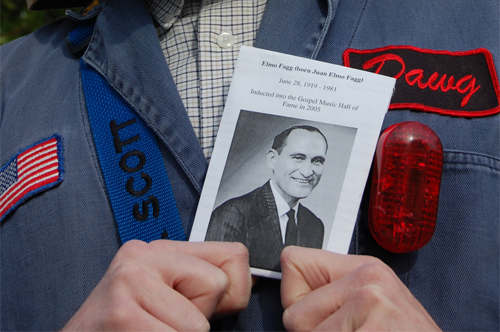
Another famous name in local music history is Fagg, as in Juan Elmo Fagg. Fagg would be born on June 28, 1919 in Alcoa, Tennessee. Fagg would later go on to be the manager and lead singer for the Blue Ridge Quartet. In 1951, Spartanburg's WSPA-AM radio branched out into television and Elmo Fagg's Blue Ridge Quartet became a regular feature. Elmo Fagg would be inducted into the Southern Gospel Music Association's Hall of Fame in 2005. |
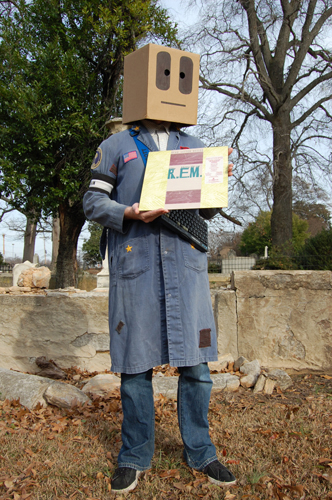
Elmo Fagg would also be mentioned in the R.E.M. B-side, "Voice of Harold."
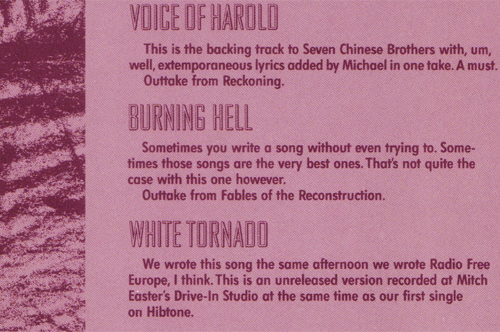
"Voice of Harold" consists of the music of the R.E.M. song "7 Chinese Brothers" combined with audio of singer Michael Stipe reading the Elmo Fagg penned liner notes from the back cover of The Joy Of Knowing Jesus LP, by The Revelaires. |
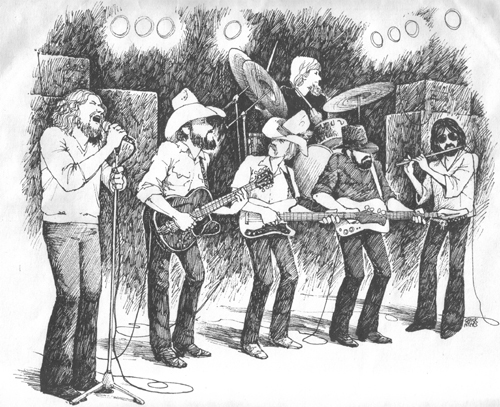
Spartanburg's best known band must be The Marshall Tucker Band. The Marshall Tucker Band's original lineup of Toy Caldwell, Tommy Caldwell, Doug Gray, Jerry Eubanks, George McCorkle and Paul Riddle would come together in 1972. Their eponymous debut album would be released on Capricorn Records in 1973 and certify gold in 1975. They would release their second and third LPs, A New Life and Where We All Belong, in 1974. Both would certify gold, as would 1975's Searchin' for a Rainbow. |
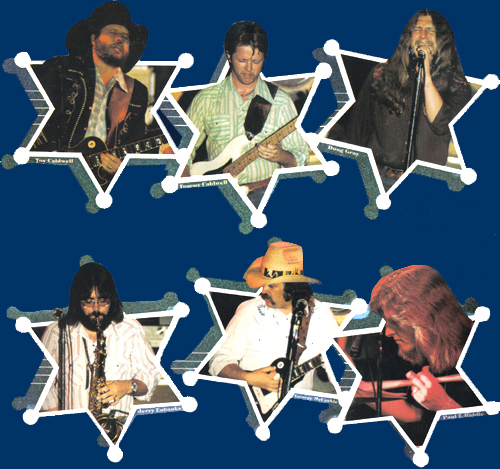
The Marshall Tucker Band would start off 1977 by playing Jimmy Carter's inaugeration. The remainder of the 1970s would go extremely well for The Marshall Tucker Band. Indeed, from 1975-1980, The Marshall Tucker Band would put seven songs onto the Billboard Hot 100. Those songs would be, "This Ol' Cowboy" (from Where We All Belong), "Fire on the Mountain" (from Searchin' for a Rainbow), "Heard It in a Love Song" (from Carolina Dreams), "Can't You See" (from Greatest Hits), "Dream Lover" (from Together Forever), "Last of the Singing Cowboys" (from Running Like the Wind) and "It Takes Time" (from Tenth). |
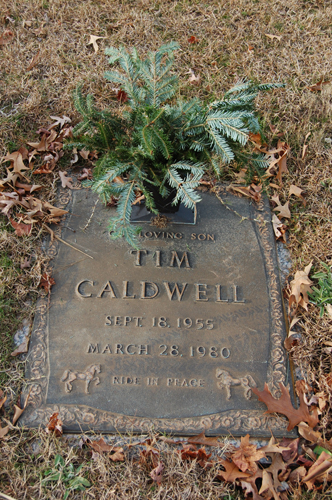
But, then, on March 28, 1980 something terrible happened. Tim, the younger brother of Toy and Tommy Caldwell, would die in a car wreck on a rural road. |
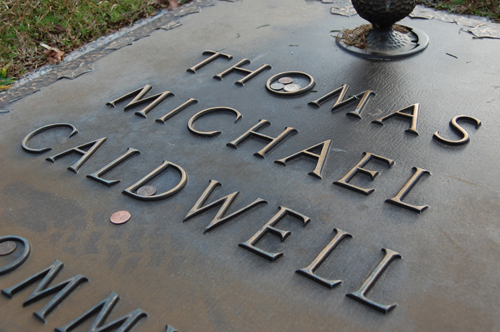
Then, on April 22, 1989, Thomas Michael "Tommy" Caldwell would be involved in a serious Jeep accident. Caldwell would, on April 28 - a month to the day after Tim Caldwell had died - pass away from injuries he suffered in the accident. In the span of a single month Toy Caldwell had lost both of his brothers. |
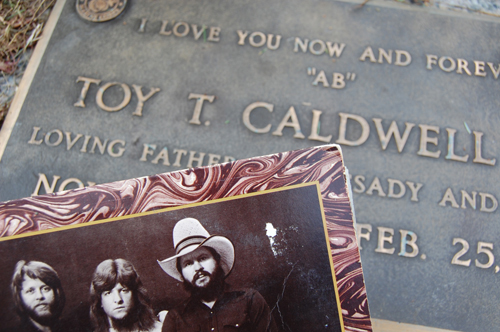
Toy Caldwell would, however, soldier on with The Marshall Tucker Band. Dedicated, released in 1981, would feature "Ride in Peace," a song, "Dedicated to Tim and Tommy Caldwell and to all lost loved ones." In 1982, The Marshall Tucker Band would release Tuckerized. Then, in 1983, The Marshall Tucker Band did something unusual, they recorded their album Just Us in their own specially designed Spartanburg studio. Just Us would also be the first Marshall Tucker Band album to feature Garfeel Ruff keyboardist Ronnie Godfrey as a fully integrated member. Ronnie Godfrey had been born blind in Greenville, South Carolina and had gone on to release an album on Capitol with his band, Garfeel Ruff. After 1983's Greetings from South Carolina, however, The Marshall Tucker Band would call it quits. |
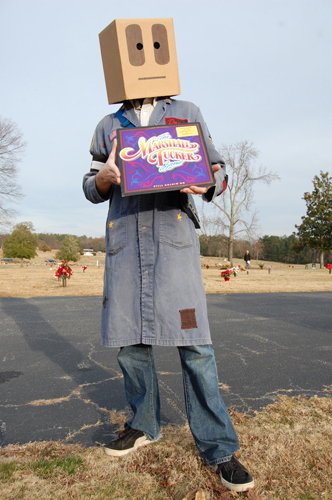
In 1988, a reformulated Marshall Tucker Band, consisting of Doug Gray, Jerry Eubanks, Rusty Milner and Bobby Ogdin, would release a new album, Still Holdin' On, on PolyGram. Southern Spirit would follow in 1990, and Still Smokin' would come in 1992. |
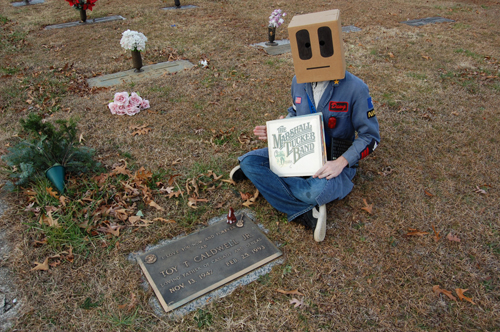
Then, on February 5, 1993, Toy Caldwell would die in his sleep.
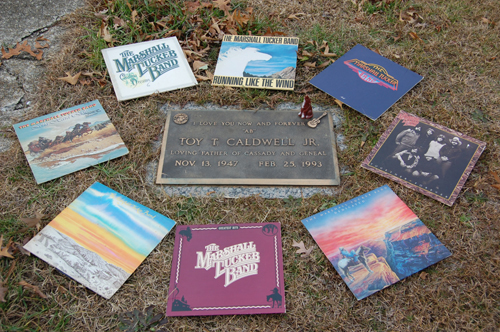
Toy's death would mark the end of an era. In later years, Jerry Eubanks would sell his portion of the band to Doug Gray. The Marshall Tucker Band now consists of a single original member, Doug Gray. This incarnation, sometimes derisively referred to as The Partial Tucker Band, continues to tour with several dates already set up for 2010. |
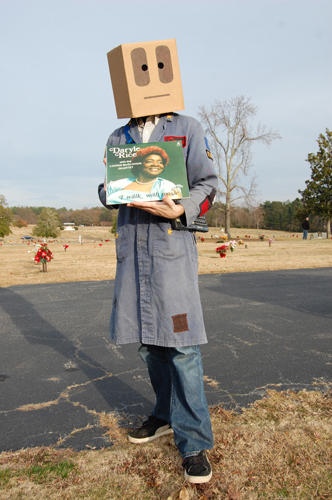
Another notable Spartanburg musician is Daryle Rice. As a high school senior, Daryle Rice would receive a music scholarship to Converse College. Rice would move to Charlotte, North Carolina where she would meet musician Loonis McGlohon. Together they would record 1980's, I walk with music for Audiophile Records of Atlanta, Georgia. |
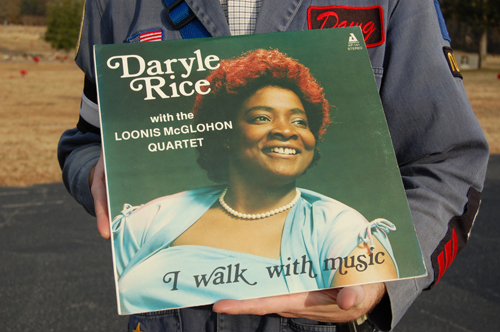
The liner notes of I walk with music tell of Rice's start, "... in hometown Spartanburg, SC. An early and still continuing fascination with different instruments sharpened her skills. Then one day she called an agent and got a job as a single in Toledo, Ohio, singing and accompanying herself on piano and guitar. She worked with assorted instrumental groups for years in clubs. These engagements took her through the Midwest and landed her in Charlotte, NC where she came to the attention of the composer-pianist Loonis McGlohon." In the mid-1980s Daryle Rice would change the spelling of her last name to Ryce. Ryce has gone on to record a number of albums and tour not only America, but the world. You can catch Ryce 52 Wednesdays a year at Vern's on East Main Street. |
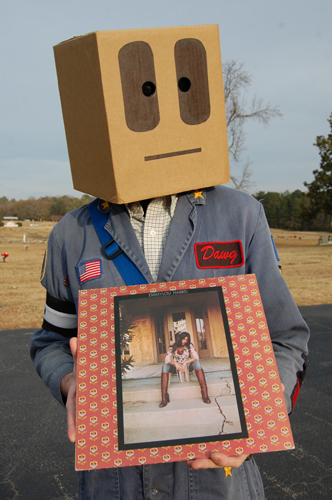
Another Spartanburg resident, Fayssoux Dunbar, would gain fame through her work with Emmylou Harris. Emmylou Harris first met Fayssoux when Fayssoux was married to singer/guitarist/founder of The Seldom Scene, John Starling. At that time, the early 1970s, Fayssoux and her husband were living in the Washington, DC area. In DC the Starlings would meet a young Emmylou Harris. Fayssoux and John Starling would support Harris on Harris' first official release, Pieces of the Sky. |
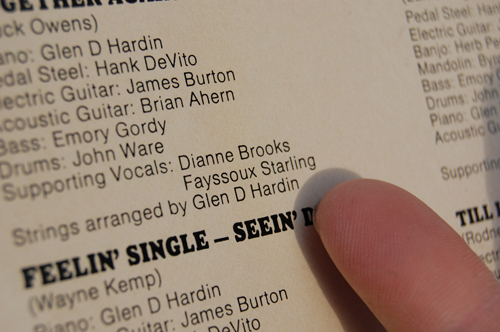
Emmylou Harris' second album, Elite Hotel, would be released in 1975 on Warner Bros. Records. Elite Hotel would feature Fayssoux on supporting vocals on five tracks. Furthermore, Fayssoux and John Starling would earn an arrangement credit for the track, "Satan's Jewel Crown." Fayssoux would also appear on Harris' Luxury Liner, Quarter Moon in a Ten Cent Town, Blue Kentucky Girl and Cimarron albums. Fayssoux Starling has remarried and she continues to play out under her new name, Fayssoux McLean. |
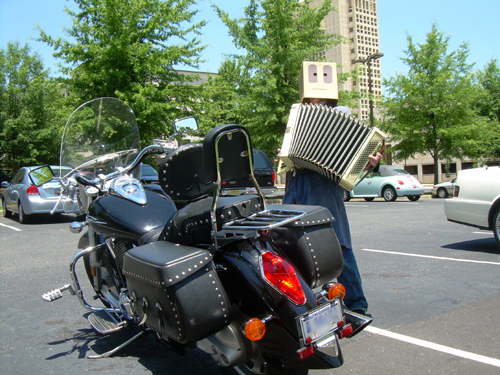
Slobot would like to thank William Walker, Juan Elmo Fagg, Toy Caldwell, Tommy Caldwell, Doug Gray, Jerry Eubanks, George McCorkle, Paul Riddle, Pinkney "Pink" Anderson, Emmylou Harris, Fayssoux McLean, Peter Cooper, Daryle Ryce, Greenlawn Memorial Gardens, BJ Music Discs and Boards, the Spartanburg County Libraries Headquarters and YOU! |
